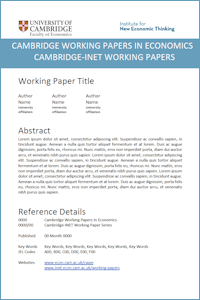
Corsetti, G., Kuester, K. and Müller, G. J.
The Case for Flexible Exchange Ratesin a Great Recession
WP Number: 1610
Abstract: We analyze macroeconomic stabilization in a small open economy which faces a large recession in the rest of the world. We show analytically that for the economy to remain isolated from the external shock, the exchange rate must depreciate not only upfront, to offset the collapse in external demand, but also persistently to decouple domestic prices from deflation in the rest of the world. If monetary policy becomes constrained by the zero lower bound, the scope of exchange rate depreciation is limited and the economy is no longer isolated from the shock. Still, in this case there is a "benign coincidence": fiscal policy is particularly effective in stabilizing economic activity. Under fixed exchange rates, instead, the impact of the external shock is particularly severe and the effectiveness of fiscal policy limited.
Keywords: Benign coincidence, exchange rate, External shock, External-demand multiplier, Fiscal multiplier, Great Recession, zero lower bound
JEL Codes: F41 F42 E32
Author links: Giancarlo Corsetti
PDF: wp1610.pdf 
Open Access Link: 10.17863/CAM.1069
